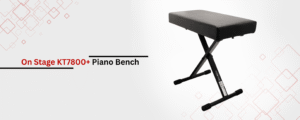Jazz pianists are known for their expressive playing, dynamic movement, and the need for flexibility at the keyboard. The right bench can make a significant difference in both comfort and performance, especially during long sessions or gigs where posture and mobility are crucial. Swivel and adjustable piano benches have become popular among jazz musicians for their ability to accommodate shifting positions, quick changes in playing height, and the freedom to move naturally with the music. This blog explores what makes a bench ideal for jazz pianists, highlighting top models and the features that set them apart.
Why Swivel and Adjustable Benches Matter for Jazz Pianists
Jazz piano often demands more than just sitting still and playing notes. The improvisational nature of jazz means pianists frequently shift their weight, lean into phrases, and sometimes even pivot to interact with other musicians or reach for pedals and controls. A bench that can swivel allows for these natural movements without restriction, while adjustable height ensures that every player can find their optimal ergonomic position.
Key Features to Look For:
- Swivel Function: Enables smooth rotation, allowing the pianist to turn or shift direction easily during performance or rehearsal.
- Height Adjustability: Provides the flexibility to set the bench at the perfect height for different pianos, playing styles, or even multiple users.
- Sturdy Construction: Ensures stability and safety, even during energetic or extended performances.
- Comfortable Padding: Thick, high-density foam or memory foam helps reduce fatigue and maintain comfort during long sessions.
- Portability: Lightweight or foldable designs are ideal for gigging musicians who need to transport their bench between venues.
Top Benches for Jazz Pianists
We’ve shortlisted some of the best benches that offer the flexibility, comfort, and adjustability jazz pianists need. Here’s the list:
5 Core KBB HD Piano Bench:
The 5 Core KBB HD Piano Bench places heavy consideration on comfort with its 2-inch padded seat. Their heavy-duty steel frame is designed for structural stability. The bench offers 4 height adjustment options from 14.5 to 20.5”, so proper ergonomic posture is maintained for any pianist during extended play. The heavy-duty X-style steel frame provides excellent stability and supports up to 340 lbs, making it suitable for a wide range of users. Non-slip rubber end caps keep the bench securely in place and protect floors from scratches.
Pros:
- Multiple height adjustment ranges (14.5 to 20.5 inches) allow for precise ergonomic customization, supporting optimal posture for players of any age or size.
- Flexible design easily accommodates both seated and standing playing positions, adapting to various instruments and performance needs.
- Extra-thick, high-density 3-inch cushioning delivers superior comfort and maintains its shape, reducing fatigue during long sessions.
- Rugged metal alloy X-frame ensures exceptional stability and long-term durability, even with frequent use.
- Impressive weight capacity of up to 340 lbs allows the bench to comfortably support a broad range of users and playing scenarios.
- Outstanding value for money, offering premium features and robust construction at one of the most accessible price points in its class.
Cons:
- Overall, I liked the piano bench. I was expecting 3 days of delivery, but I received it after 4 days, which is negligible.
Upgrade your practice and performance setup—choose a piano bench that delivers ergonomic comfort and reliable support.
Find the ideal piano bench for your space and playing style—explore adjustable, cushioned options built for lasting use.
On Stage KT7800+ Piano Bench:
The On-Stage KT7800+ piano seat features a thick, high-density foam seat and an all-welded steel frame for comfort and durability during long sessions. Its quick-adjust height settings (19.5″ to 24.5″) make it versatile for different keyboard setups and user preferences. The spring-loaded double deadbolt locking mechanism ensures secure positioning, while non-slip rubber end caps add stability. Although the bench folds flat for storage, its sturdy build makes it bulkier and less portable than ultra-lightweight models
Pros:
- The thick, high-density foam seat provides lasting comfort for extended playing sessions without causing strain.
- Non-Slip pads provide stability.
- Solid metal construction provides extra durability and stability.
- Multiple Height Adjustments.
Con:
- Due to the limited folding mechanism, the bench is bulkier and less portable when compared to ultra-portable models.
- Bulkier as compared to other models.
- No built-in storage compartment for sheet music or accessories.
- Limited color Options.
- A bit expensive as compared to torah models.
- May require more space for storage and transport compared to slimmer, minimalist benches.
Donner EC2060 Piano Bench:
Constructed with a rigid x-style metal frame, the Donner EC2060 is ideal for serious pianists due to its elegant and functional design. The generous cushioning, along with its multiple height adjustments, makes it ideal for musicians of all sizes.
Pros:
- The thick 2.5 inches of comfortable cushioning helps reduce fatigue a lot for long playing sessions.
- The multiple height versatility makes for multiple settings, which further make it customizable for the perfect playing posture.
- Durable X-style metal frame supports stability and longevity
- Padded faux leather seat is comfortable and easy to clean
Cons:
- Compared to basic models, it is slightly bulky.
- Limited Color Options.
- Complex Assembly Process
- No built-in storage compartment
Conclusion
For jazz pianists, the right bench is an essential part of their creative toolkit, offering not just a place to sit but crucial ergonomic support and flexibility during dynamic performances. Adjustable and well-cushioned benches help maintain comfort and proper posture, allowing musicians to focus fully on their playing without distraction.
Brands such as 5 Core, On Stage, and Donner are recognized for producing benches that meet the unique demands of jazz musicians. By selecting a bench from these trusted names, pianists can ensure that every session is both comfortable and inspiring, supporting their artistry at every turn.




